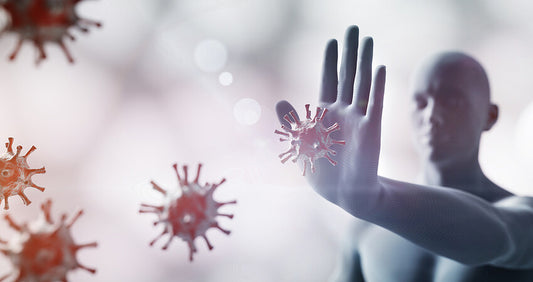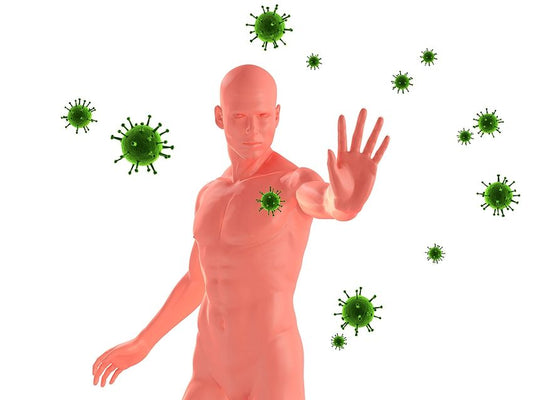The immune system is anything but simple, and it’s linked to nearly every other system in the body. If you’re trying to protect it and keep it functioning as it should, there’s no shortage of things that you can supplement with—vitamin C, vitamin D, selenium, antioxidants, and of course, zinc.
Zinc is one of those supplements that’s widely available in many food sources, but most people still don’t get enough. Whether that’s a result of poor absorption, low dietary intake, excessive exercise, or the like, low zinc levels mean that the immune system doesn’t have what it needs to perform at its peak.
In lieu of that, we’re talking about all things zinc and immune function—why zinc is important, how it supports immunity, what weakens immune defenses, and the top zinc supplements for enhanced immune function.
Let’s get to it.
What Is Zinc And Why Do We Need It?
Zinc is the second most abundant trace mineral in the human body that plays a number of critical roles. As there is no storage system for zinc, it must be obtained daily through diet or supplementation to maintain adequate levels.
Of the roles, perhaps the most notable is zinc’s support for men’s reproductive health 1. It’s involved in germination, sperm quality, and fertilization, along with acting as an antioxidant to prevent cellular damage from reactive oxygen species and supporting appropriate testosterone levels. Zinc is also required for epithelial integrity and maintaining the lining of the reproductive organs.
Aside from playing a critical role in male reproductive health, it’s also required for 2:
- Skin health
- Appetite
- Wound healing
- Cognitive function
- DNA synthesis and cell division
- Immune cell function
The Link Between Zinc And The Immune System
Because zinc is a mineral that cannot be produced in the body and cannot be stored, obtaining sufficient amounts from the diet is critical for supporting proper immune function.
It’s been established for quite some time that zinc affects multiple aspects of the immune system, from skin barrier function to gene regulation within lymphocytes, but is also required for normal development and function of cells mediating the nonspecific immune response, including neutrophils and natural killer (NK) cells.
A deficiency of zinc has been linked to impaired immune function, but also interference with the development of acquired immunity by preventing both the outgrowth and specific functions of T lymphocytes like activation, Th1 cytokine production, and B lymphocyte help 3.
Likewise, zinc deficiency compromises both B lymphocyte development and antibody production, along with the function of macrophages, which are critical for several immunologic functions.
Diving into this further, one of the major roles of zinc in immune health is for the function of the thymus. Thymulin is a thymus-specific hormone that requires zinc for its biological activity to be expressed 4.
Thymulin binds to high-affinity receptors on T cells, a type of immune cell, and induces several T-cell markers, promotes T-cell function, and the production of interleukin-2 (IL-2). Because of this role, a mild zinc deficiency interferes with the activity and concentration of thymulin.
Other research shows that natural killer (NK) cells’ activity is also sensitive to zinc levels. Sufficient levels of zinc support enhanced NK cell activity by increasing the expression of perforin, which results in increased killing of target cells 5.
Additionally, zinc supplementation has also been shown to increase interleukin (IL)-2 enhanced NK cell activity, which also contributes to cellular killing.
The other key area where zinc comes into the picture is inflammation and oxidative stress.
Inflammation is a natural process essential for protecting the host from tissue damage and infection. In normal circumstances, the acute inflammatory response subsides, and homeostasis is restored.
However, sometimes the inflammation does not resolve and turns chronic, which can lead to loss of tissue function.
Zinc plays a crucial role in modulating the inflammatory response by targeting NF-κB, a transcription factor that is the master regulator of proinflammatory responses in the body, but zinc is also involved in regulating levels of oxidative stress and inflammatory cytokines, both of which are involved in inflammation 6.
New research suggests that zinc may help control infections by tapping the brakes on the immune response to help prevent inflammation from running rampant and causing damage 7. The reason why is because zinc is able to stop the action of a specific protein, which ultimately prevents excess inflammation.
When a pathogen enters the body and is recognized, a cascade is set into action that activates the innate immune response. A major part of this response involves the NF-κB pathway. Once NF-κB is activated and enters the cells’ nucleus, a gene is expressed that produces a zinc transporter called ZIP8 8.
This transporter is used to shuttle zinc from the bloodstream into the cell, and once inside the cell, zinc controls different proteins in the NF-κB pathway.
Binding essentially puts a stop to any further activity in that pathway. The cumulative effect of this feedback loop is mitigating inflammation and preventing it from damaging cells.
Additionally, zinc also possesses other properties that could contribute to its role in lymphocyte function. As an antioxidant, zinc promotes cellular protection from the damaging effects of reactive oxygen species generated during immune activation 3. It also regulates the expression in lymphocytes of metallothionein and metallothionein-like proteins with antioxidant activity.
What Weakens Immunity?
The thing with immune function is that as much as we try to protect it with a good diet and supplementation, there are a lot of lifestyle factors that work against it. These are some of the biggest hitters where immunity is concerned:
1. Stress
Stress is huge for immune function. While acute stress can be beneficial for activating the immune system and strengthening responses, chronic stress or infection exhausts the immune system and impairs its responses, making it less effective at responding to pathogens or stresses.
Inflammation associated with the stress response is a necessary short-term response for eliminating pathogens and stimulating healing, but like we said, chronic, systemic inflammation leads to dysregulation of the immune system and increases the risk of chronic disease development 9.
2. Diet
Diet is a big one where immune function is concerned for a couple of reasons. Other than supplementation, it’s the key entryway for nutrients needed to support immune function—zinc, selenium, vitamin C, vitamin D, amino acids, etc.
If you’re eating a diet high in processed foods and low in protein and fruits and vegetables, chances are you’re going to be deficient in nutrients required to support the innate and adaptive immune system. Both undernutrition and excessive intake can impair immune function 10.
But then we also have to look at the type of diet you’re consuming. A plant-based diet is often abundant in anti-nutrients, which are compounds that bind to minerals and interfere with absorption, but also trigger inflammation, alter gut function, and disrupt endocrine function, all of which are important aspects involved in the immune system 11.
Anti-nutrients are things like lectins, oxalates, phytates, goitrogens, phytoestrogens, and tannins that are common to beans and legumes, cereal grains, soy, nuts and seeds, and some fruits and vegetables. They primarily interfere with the absorption of zinc, iron, and calcium.
3. Lack Of Sleep
A few nights of poor sleep may seem like no sweat, but it can start to wreak havoc on your immune system.
Research has shown that during sleep, certain components of the immune system rev up; there is increased production of cytokines associated with inflammation, and while this inflammation happens even without sickness or injury, the cells and cytokines involved in this response work to strengthen the adaptive immune system 12.
Proper sleep is also crucial for strengthening immunological memory, which is needed to reinforce the immune system’s ability to remember how to recognize and react to pathogens.
4. Lack Of Exercise (Or Too Much Exercise)
Lack of or excessive physical activity affects your overall state of health and well-being, but it can be detrimental to immune function. Moderate-intensity exercise has been shown to improve immune responses to vaccinations, reduce chronic low-grade inflammation, and improve various immune markers in several diseases, including cancer, HIV, cardiovascular disease, diabetes, cognitive impairment, and obesity 13.
But the problem with sitting on either end of the spectrum—either too little or too much exercise—is that it actually suppresses immune function. This is due, in part, to increased circulating levels of stress hormones that suppress various aspects of the immune system, including white blood cell functions.
Studies indicate that there is transient immune dysfunction after heavy exertion that causes physiological, metabolic, and psychological stress that are linked to immune dysfunction, inflammation, oxidative stress, and muscle damage 14.
On the other hand, physical inactivity and its consequences, including adipose tissue accumulation and muscle dysfunction, can have deleterious effects on both innate and adaptive immunity 15.
Lack of activity has been shown to increase systemic inflammation (increased levels of TNF-α, IFN-γ, CRP), impair natural killer cell cytolytic activity, and reduce T-cell proliferation and cytokine production, all of which result in impaired ability to fight pathogens.
Best Products For Supporting Immune Function
Performance Lab PL-Immune™

Performance Lab PL-Immune™ is the most comprehensive dynamic immune support supplement on the market designed to support short and long-range immune health by activating five different types of immune cells for full-spectrum coverage.
PL-Immune™ is a breakthrough immunity formula consisting of a dynamic probiotic and antioxidant stack that activates multiple types of immune cells to restore frontline defenses first and support your natural immune function for robust long-range health.
Whatever immune challenge you’re facing, PL-Immune™ attacks it head-on to get you back on your feet fast.
Key benefits
- Fortifies first-line immune defenses and long-range immune responses
- Replenishes antioxidants for immune system offense and defense
- Formulated to help increase the number and activity of immune cells
- Maintains work productivity and performance via overall immune wellness
- Helps fight immune challenges and fatigue associated with exercise
Key features
- 25mcg NutriGenesis Vitamin D
- 30mg NutriGenesis Vitamin C
- 25mcg NutriGenesis Selenium
- 5mg NutriGenesis Zinc
- 50mg IMMUSE™ Paraprobiotic
- 250mg Setria Glutathione
Performance Lab NutriGenesis Multi for Men and Multi for Women

Level up your supplement game with Performance Lab NutriGenesis Multi. It’s the most innovative and comprehensive multivitamin supplement on the market specifically catered to men’s and women’s needs, supplying 17+ essential vitamins and minerals to support optimal full-body function.
NutriGenesis vitamins and minerals are bioengineered using groundbreaking NutriGenesis® technology designed to mimic what’s found in nature. They are complexed with natural cofactors, including probiotics, fiber, enzymes, and antioxidants that enhance their bioavailability and health-supportive activity.
Unlike other multivitamin supplements that don’t supply enough of certain nutrients, Performance Lab NutriGenesis Multi is precisely calibrated to restore with as much as needed, but no more than necessary.
It’s there to help you build a strong nutritional foundation for healthy human performance.
Key Benefits
- Foundational nutritional support for healthy whole-body biological performance
- Supports daily vitality and long-range overall health
- Customized; gender-specific support for optimal hormonal support
- Complexed with absorption-enhancing cofactors; no synthetic or isolated nutrients
Key Features
- Supplies at least 100% DV of 17+ essential vitamins and minerals
- NutriGenesis® vitamins and minerals complexed with cofactors for enhanced absorption and utilization
- Probiotic-cultivated NutriGenesis® + prebiotic-infused NutriCaps® for digestive comfort
Key Takeaways
Immune support can be a complex thing, but when you’re stacked with the best immune-boosting supplements containing zinc, you don’t need to worry about whether your immune system can fight off pathogens.
Pop them back daily, and you’re covered from every angle wherever and whenever you need it.
References
- A Fallah, A Mohammad-Hasani, AH Colagar. Zinc is an Essential Element for Male Fertility: A Review of Zn Roles in Men’s Health, Germination, Sperm Quality, and Fertilization. J Reprod Infertil. 2018;19(2):69-81.
- AS Prasad. Zinc: an overview. 1995;11(1 Suppl):93-99.
- AH Shankar, AS Prasad. Zinc and immune function: the biological basis of altered resistance to infection. Am J Clin Nutr. 1998;68(2 Suppl):447S-463S.
- AS Prasad. Zinc in human health: effect of zinc on immune cells.Mol Med. 2008;14(5-6):353-357.
- B Rolles, M Maywald, L Rink. Influence of zinc deficiency and supplementation on NK cell cytotoxicity.Funct. Foods. 2018;48:322-328.
- NZ Gammoh, L Rink. Zinc in Infection and Inflammation. 2017;9(6):624.
- Ohio State University. “Zinc helps against infection by tapping brakes in immune response.” ScienceDaily. ScienceDaily, 7 February 2013.
- MJ Liu, S Bao, M Gálvez-Peralta, et al. ZIP8 regulates host defense through zinc-mediated inhibition of NF-κB. Cell Rep. 2013;3(2):386-400.
- JN Morey, IA Boggero, AB Scott, SC Segerstrom. Current Directions in Stress and Human Immune Function.Curr Opin Psychol. 2015;5:13-17.
- CE Childs, PC Calder, EA Diet and Immune Function.Nutrients. 2019;11(8):1933.
- W Petroski, DM Minich. Is There Such a Thing as “Anti-Nutrients”? A Narrative Review of Perceived Problematic Plant Compounds. 2020;12(10):2929.
- MR Irwin. Sleep and inflammation: partners in sickness and in health.Nat Rev Immunol. 2019;19(11):702-715.
- RJ Simpson, JP Campbell, M Gleeson, et al. Can exercise affect immune function to increase susceptibility to infection?. Exerc Immunol Rev. 2020;26:8-22.
- DC Nieman, LM The compelling link between physical activity and the body’s defense system.J Sport Health Sci. 2019;8(3):201-217.
- A Damiot, AJ Pinto, JE Turner, B Immunological Implications of Physical Inactivity among Older Adults during the COVID-19 Pandemic.Gerontology. 2020;66(5):431-438.















